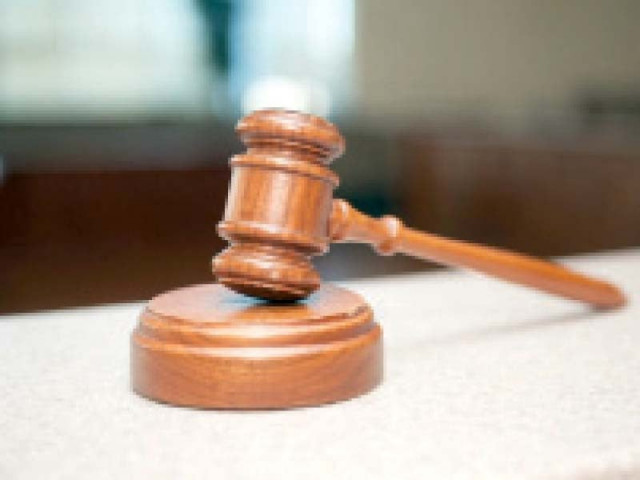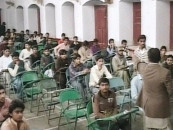Superior judiciary: Adjudicating amid polarisation
Senior lawyers believe judiciary should show restraint, protect parliamentary supremacy

The superior judiciary has found itself navigating through the enormous challenges of adjudicating cases of political nature in a polity that's being increasingly gobbled up by unsparing political polarisation.
Supposed to examine cases objectively and deliver a last word on disputes, the judiciary has been at the receiving end of murky logics of the realpolitik and power struggle.
No political party, however otherwise loquacious about supremacy of law, seems to be comfortable with verdicts that 'favour' their archrivals.
After the restoration of judges since March 2009, the superior courts have played a pivotal role in shaping the national politics by adjudicating disputes that came with political consequences.
However, the courts are dragged into the political thicket by politicians and subjected to vehement criticism if a relief is given to a rival. More often than not, they are loath to accept the verdicts with grace and play by Queensberry rules.
Recently, when the Islamabad High Court (IHC) set aside conviction of Maryam Nawaz in Avenfield, the PTI strongly criticised the judgment and termed it a "failure of justice".
Conversely, when the same court discharged contempt notice against Imran Khan, PML-N supporters lashed out at the high court.
It is learnt that the IHC has granted protective and interim bail to more than one thousand individuals on holidays or after court timings during the tenure of IHC Chief Justice Athar Minallah.
In October 2019, when the IHC granted bail to PML-N supremo Nawaz Sharif on medical grounds, the PTI seized on it to criticise the high court for handing out a relief on a Saturday as usually superior courts judges do not sit on Saturdays.
Similarly, when the IHC granted protective bail to Imran Khan on last Sunday, similar criticism was heard echoing from PML-N's side and its allies, pointing out that the relief was given on a holiday.
Now, the IHC is facing criticism for not convicting Imran Khan by following jurisprudence evolved in contempt cases against Nehal Hashmi, Talal Chaudhry and Daniyal Aziz.
Lawyers, however, appreciate the high court for avoiding to follow the precedents.
Interestingly, intense polarisation has also seemingly divided the media into "pro-PTI" and "pro-PML-N" camps.
'Courts should be consistent'
Senior lawyers believe that irrespective of the party, the courts should be consistent in giving relief in matters related to civil liberties.
The courts, the stress, should always strengthen the parliamentary supremacy by showing restraint in the adjudication political disputes.
Similarly, political leaders should also show maturity by not approaching the courts for political gains.
On the other hand, the challenges for the Supreme Court are different as it is facing the battle of perception.
During tenure of ex-CJP Iftikhar Muhammad Chaudhry, PPP was accusing the judiciary of weakening it's regime by interfering in matters which had political consequences.
Likewise, ex-CJP Mian Saqib Nisar was accused of giving tough time to PML-N.
Currently, the Supreme Court is divided on idealogical lines as PTI is comfortable before one section judges and some judges are in the good books of the PML-N and it's supporters.
A similar scenario was witnessed during deputy speaker Punjab Assembly ruling case wherein PML-N and it's allies parties had boycotted the SC proceedings on account of SC refusal to form full court to hear the matter.
However, it is witnessed that whenever SC passes the order in favour of one political party, rivals start campaign against judges.
The severity of the matter was also highlighted by IHC CJ Athar Minallah who in his address at 9th International Judicial Conference said that today, speaking plainly, we are a very polarised
polity.
"This places a special burden on the judiciary, which is the ultimate arbiter of the law and the Constitution in disputes between citizens, or between the citizens and the state, or amongst state institutions," he said.
"We must conduct ourselves in a manner that does not bring our moral legitimacy, sociological legitimacy or legal legitimacy into question, as we are the ultimate dispute-resolution mechanism in the state."
"We cannot refuse to adjudicate legal aspects of the disputes that produce political consequences. These are the cases wherein the legal analysis is not difficult, but the political consequences of correct judicial decisions can be far-reaching," he stressed.
The courts around the world tend to get influenced by the consideration of political consequences their decisions will produce. We must remind ourselves that political consequences of judicial decisions are an extraneous consideration that we have sworn in our oaths not to bear in mind, he added.



















COMMENTS
Comments are moderated and generally will be posted if they are on-topic and not abusive.
For more information, please see our Comments FAQ